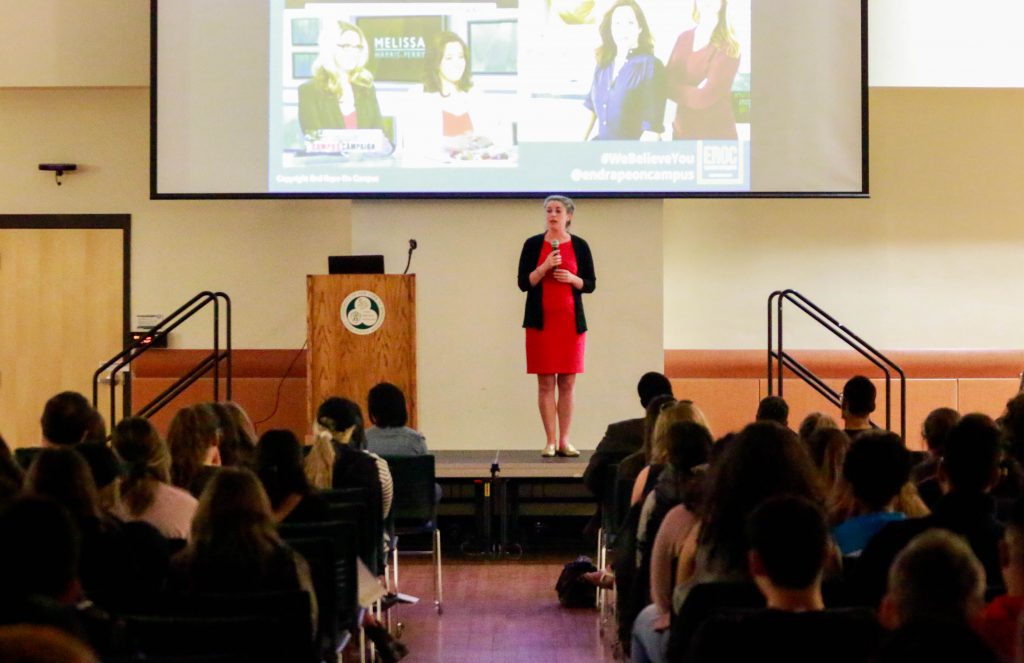
One in five women and one in 16 men are sexually assaulted while in college, according to the National Sexual Violence Resource Center. Within the LGBTQ community, transgender people and bisexual women face the highest rates of sexual violence, according to the Human Rights Campaign.
These statistics, along with many others, were highlighted at “Moving from the Margins into Action,” a two-day event hosted by Heath Promotion and Prevention Services in an effort to raise awareness about sexual assault on college campuses. It included programming from the Multicultural Resource Center, the Interfraternity Council (IFC), the Q Center and Binghamton University’s 20:1 Bystander Intervention Program.
The first talk, located in the Mandela Room in the University Union, featured keynote speaker Annie Clark, co-founder of End Rape on Campus, a survivor advocacy organization. Clark gave a talk on campus activism and ending rape on campus, focusing on “The Hunting Ground,” a documentary chronicling Clark and her friend Andrea Pino’s experiences filing a Title IX lawsuit against the University of North Carolina at Chapel Hill, where they were both sexually assaulted as undergraduates.
Title IX, a federal civil rights law, states “no person in the United States shall, on the basis of sex, be excluded from participation in, be denied the benefits of, or be subjected to discrimination under any education program or activity receiving federal financial assistance,” according to the United States Department of Justice.
Clark said the University of North Carolina’s response after she reported the incident was centered around victim-blaming, giving her few resources.
“I didn’t have the vocabulary to address the problem [of the University’s response] fully, but something didn’t feel right,” Clark said.
It was only when she began teaching at the University of Oregon and hearing similar stories from students that she realized campus rape isn’t unique to the University of North Carolina — it is a nationwide epidemic. In her talk, Clark emphasized the importance of supporting survivors and fighting rape culture and societal myths, such as the belief that half of rape accusations are fake and the notion that men cannot be raped.
“‘I believe you’ is a really important thing to say because we live in a society that tells exactly the opposite,” Clark said. “We have to remind survivors it’s not their fault.”
Yitzhak Maurer, president of the IFC and a junior double-majoring in classical and Near Eastern studies and anthropology, helped organize the event. According to Maurer, hearing from people like Clark is especially important because of how widespread sexual assault is in relation to Greek life.
“I don’t think it’s just waiting on the administration or waiting on the student body — we all need to work together to push these ideas, tell survivors we believe them, have more events like this to have conversations and end the normalization of rape culture,” Maurer said.
At another talk, Kelly Clark, director of the Q Center, spoke on Friday afternoon in the University Union. She said she was invited to give a talk on sexual assault and LGBTQ communities because LGBTQ individuals face higher rates of sexual assault than other populations.
“Health Prevention and Promotion Services really felt it was important for us to not just have a general big conversation, but to actually look at some subpopulations on campus,” Kelly said. “Because the LGBTQ population is so affected, overly affected, I was one person they invited.”
According to statistics read during the event, the prevalence of lifetime sexual assault ranged from 12 to 15 percent among gay and bisexual men and from 16 to 85 percent among lesbian and bisexual women, compared to 2 to 3 percent for straight men and 11 to 17 percent for straight women.
“Homophobia and transphobia is not just discrimination in the moment,” Kelly said. “I could bully someone and hurt their feelings in the moment, but it actually sets up the environment for violence to happen. The dislike, the mistrust, the hatred for LGBTQ people sets up their lives to be more violent and I think we see that in the statistics.”
Dylan Tarleton, an intern for the 20:1 Program and a sophomore double-majoring in sociology and Japanese studies, said he chose to come to Kelly Clark’s talk so he could educate himself.
“I’m just, like, a white guy so I kind of need to go to places like this to hear from people who are actually part of these communities to actually learn from this,” Tarleton said.


